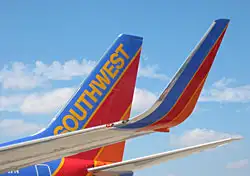
No one, not even Southwest CEO Gary Kelly, disputes that Atlanta was the big prize in its acquisition of AirTran. “I think the story here is about Atlanta,” the Dallas Morning News quotes him as saying. “[That’s] where the big numbers are.”
But Southwest has offered little about its specific plans for Atlanta, short of saying it will likely keep most of AirTran’s service there. But simply moving in at Hartsfield-Jackson may be all it needs to do. Brian Campbell, an airline analyst who has studied Southwest closely for years, told the Morning News the airline thinks it can add 2 million passengers and save Atlanta fliers $200 million a year. Adding AirTran’s 202 daily Atlanta flights to its route map would make Atlanta Southwest’s third-busiest destination.
All well and good, but consumers care most about one thing—fares, and more specifically, whether they will go up, or down. But so far, it’s not clear what impact the so-called Southwest Effect will have in Atlanta.
Some signs suggest fares will go down. The Atlanta Journal-Constitution points out, “The average domestic fare in Atlanta in the first quarter of 2010 was $355, above the national average of $328 … It also was significantly above the $248 average fare at Dallas Love Field, Southwest’s home airport.”
The AJC also notes that while fares have fallen across the nation since 2001, they’ve fallen slower at Atlanta, a 3.7 percent decline compared to 5.6 nationally. On paper, at least, Atlanta appears to be a prime target for the Southwest Effect.
Still, none of this means Southwest can influence fares, or that fares can go any lower. “Southwest coming in [to Atlanta] is not going to lower fares,” airfare analyst Mike Boyd told the AJC. “AirTran’s already done that.” The problem for Southwest is that AirTran’s costs are actually lower, so to think Southwest, with its higher overhead, can come into Atlanta and lower fares, is probably unrealistic. Which is not to say the airline won’t do it anyway, but its margin at Atlanta in particular may be much slimmer than AirTran’s.
Logic would suggest, however, that Southwest would like to make a splash when it arrives in Atlanta, especially since it hopes to attract a large portion of the area’s bustling business market. Since it can’t compete with Delta on amenities, the only option is to compete on price, which means at least keeping fares stable. Even then, there’s no guarantee business travelers will shift toward Southwest’s bare-bones service.
In all probability, the outcome will be a mixed bag: A few lower fares on popular business routes, a few higher fares where the airline’s margin is too slim, and a whole lot of who-knows-what in between. Suffice to say that whatever happens, Southwest’s success (or lack thereof) in Atlanta will go a long way toward determining the success of the merger.
Readers, how do you think Southwest will change air travel in Atlanta? Conversely, do you think serving Atlanta will change Southwest?
We hand-pick everything we recommend and select items through testing and reviews. Some products are sent to us free of charge with no incentive to offer a favorable review. We offer our unbiased opinions and do not accept compensation to review products. All items are in stock and prices are accurate at the time of publication. If you buy something through our links, we may earn a commission.
Related
Top Fares From
Today's Top Travel Deals
Brought to you by ShermansTravel
France: 8-Night Paris, Avignon & Nice...
Infinity Worldwide Vacations
 vacation
$2880+
vacation
$2880+
Poconos: 3 Nts in Garden of...
ResortsAndLodges.com
 hotel
$305+
hotel
$305+
7-Nt Canada & New England Cruise,...
Princess Cruises
 cruise
$839+
cruise
$839+



